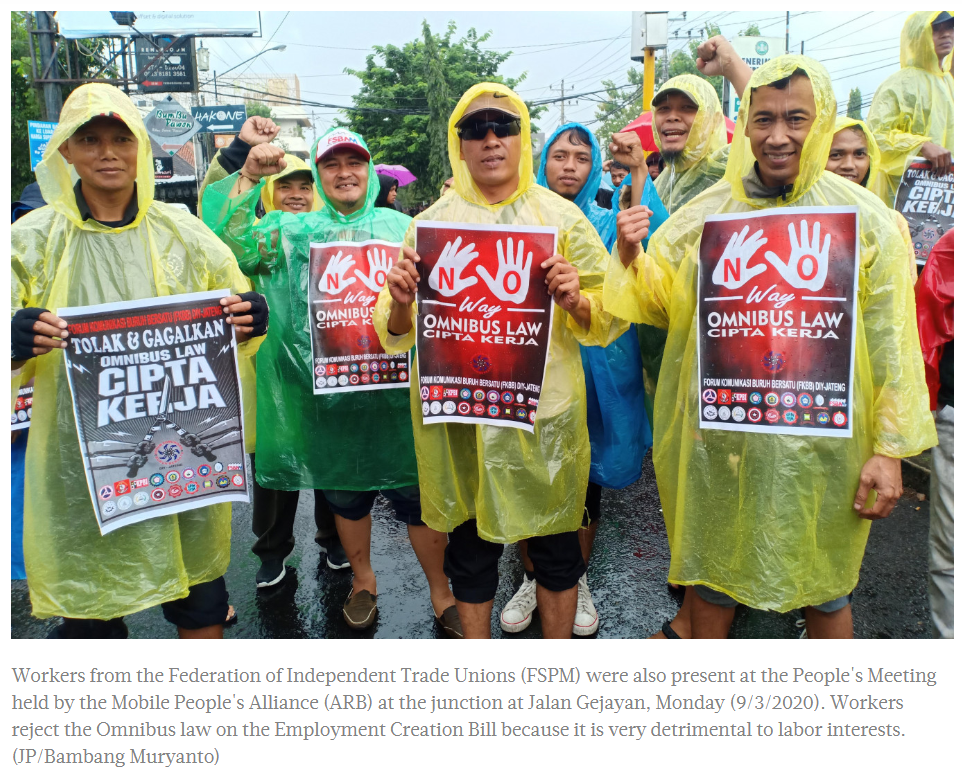Indonesia delays deliberations over labor issues in omnibus bill amid backlash
The government and the House of Representatives have decided to delay deliberations over labor provisions within the omnibus bill on job creation, resulting in the cancellation of an earlier plan by labor unions to hold mass street protests despite the coronavirus outbreak.
President Joko “Jokowi” Widodo announced on Friday that the government had reached a deal with the House to delay the labor reform, adding that it was in line with the “government’s wish”. “This will provide us with the opportunity to explore substantial issues within the bill and also to accommodate input from stakeholders,” Jokowi said in a taped video announcement.
The decision caters to the demands of labor unions, which planned to hold mass protests against the omnibus bill on job creation in front of the House of Representatives or the Office of the Coordinating Economic Minister in Jakarta on April 30 – one day prior to May Day.
Confederation of Indonesian Trade Unions (KSPI) president Said Iqbal appreciated the decision, saying it showed the government and the House were willing to listen to labor groups.
“President Jokowi’s decision is an opportunity for all of us, including workers, to maintain Indonesia’s unity in the fight against COVID-19 and manage the strategy to prevent massive layoffs after the coronavirus pandemic,” Said said in a statement.
He said the labor groups would cancel their plan to break social distancing rules and hold the nationwide rallies, but added that there should be a discussion on the labor cluster within the omnibus bill that involves all stakeholders after the coronavirus pandemic is done.
Andi Ghani Nuwa Wea, an Indonesian Democratic Party of Struggle (PDI-P) politician who is also the leader of the All-Indonesia Workers Union Confederation (KSPSI), welcomed the President’s decision, saying that he knew the President would suspend the deliberations. “I negotiated with the President. It was a long process. It took about two weeks,” he said.
The government submitted the controversial bill to the House in February to kick-start deliberations over wide-ranging economic reform that intended to woo investors, boost economic growth and create jobs. Various mass organizations including labor unions have since rejected the bill, saying it undermined labor rights and environmental protection.
“The government is looking to compromise for the good of both [businesses and labor unions],” Indonesian Employers Association (Apindo) advisory council chairman Sofjan Wanandi told The Jakarta Post. “But we feel that labor reform is the main spirit of the omnibus bill.”
The current labor regulation, he went on to say, had discouraged labor-intensive industries from entering the country, citing a lack of competitiveness and low productivity of the labor workforce. “We are OK with the decision because we are still optimistic that the government will overhaul the labor regulations.”
Jokowi’s decision is more than just a temporary victory for labor groups. The PDI-P, the largest party in the government coalition of which Jokowi is a member, has also called for the removal of the labor provisions from the bill despite the President’s initial plan to pass the bill as soon as possible.
The PDI-P’s Rieke Diah Pitaloka, who is among the leaders of a House special committee on the job creation bill, has argued that the bill should focus on what it is meant for improving the ease of doing business to attract investment. She argued that there was no reason to rush the bill during the pandemic, which is expected to trigger mass layoffs.
House speaker Puan Maharani, the daughter of PDI-P matriarch Megawati Soekarnoputri, also called for the suspension of deliberations of labor provisions within the bill. “On behalf of House leadership, […], we asked the House’s legislation body to suspend the deliberations [of the labor provisions],” she said at the House complex on Thursday.
In the wake of the coronavirus pandemic, the PDI-P has been uncharacteristically critical of the President’s policies. Another PDI-P lawmaker, Masinton Pasaribu, has slammed the regulation in lieu of law on COVID-19 relief fund issued by Jokowi, saying that the legislation contained loopholes that could pave the way for the plundering of the state budget.
Finance Minister Sri Mulyani Indrawati said earlier this month that, with economic growth projected at the lowest level since the 1998 financial crisis, 1.1 million to 3.78 million people could fall into poverty, while 2.9 million to 5.2 million workers could lose their jobs.
As many as 2.8 million people have lost their jobs as of Monday last week, according to data from the Manpower Ministry and the Workers Social Security Agency (BPJS Ketenagakerjaan). More than half were furloughed and placed on paid or unpaid leave.
Meanwhile, Perbanas Institute economist Piter Abdullah said the omnibus bill on job creation contained many problematic issues and not only on labor reforms.
“The government and the House should delay the deliberations of every cluster altogether,” Piter said. “They must first make sure and convince the public that there are no conflicts of interest in any article of the bill.”
Source: https://www.thejakartapost.com/news/2020/04/24/govt-house-delay-deliberations-over-labor-issues-in-omnibus-bill-amid-backlash.html


 Thailand
Thailand




